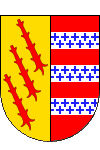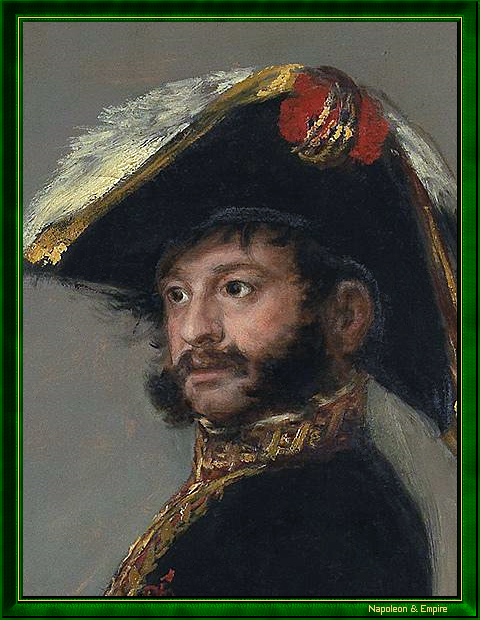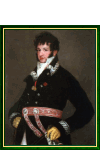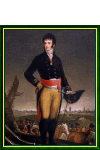José de Palafox y Melci
Duke of Zaragoza
Pronunciation:

Don José Rebolledo de Palafox y Melzi, the youngest son of an old Aragonese family (he was the third son of the Marquis of Lazán), was born in Saragossa around 1776 (between 1775 and 1780, depending on the source) and raised at the Spanish court. He joined the Royal Guards at an early age, and in 1808 earned the rank of second lieutenant.
In April 1808, Palafox accompanied the new King Ferdinand VII of Spain (in whose favor his father Charles IV had just abdicated) to the Bayonne interview with Napoleon 1st. After unsuccessfully attempting to have his king escape as a prisoner of the French, he fled to Spain.
He then took the initiative of placing himself at the head of the patriot movement in Aragon, and on May 25 was proclaimed by popular acclamation Governor of Saragoza and Captain-General of Aragon. He then declared war on the French, who were occupying neighboring Catalonia and Navarre. A bitter street battle (nowadays we would say an urban guerrilla war) saw the people of Zaragoza bravely resist the imperial troops, who were unable to take control of the entire city and were forced to withdraw on August 14, 1808, after a two-month siege.
Palafox then attempted a war to reconquer the country, but had to retreat before the army commanded by the Emperor himself, and once again shut himself in Zaragoza. This second siege lasted three months; the city withstood successive assaults by Bon-Adrien Jeannot de Moncey, Jean Lannes, Adolphe Edouard Casimir Mortier and Jean-Andoche Junot, but the besieged fell victim to terrible epidemics that reduced their numbers by more than half. Palafox, himself ill, was taken prisoner when the city fell to the French on February 21, 1809.
He was incarcerated at Vincennes in April 1809, and only released following the Treaty of Valençay on December 11, 1813.
In June 1814, Palafox was confirmed as Captain-General of Aragon, but soon retired from public affairs. From 1820 to 1823, he commanded King Ferdinand VII's royal guard. However, his liberal ideas led him to take the side of the Constitution during the demonstrations that followed the arrival in 1823 of the troops of the Duke of Angouleme (sent by his uncle King Louis XVIII of France to support Ferdinand VII) and the exile of the government and parliament to Cadiz; he was therefore stripped of all his honors and offices by the king.
It was not until 1836 that Don José de Palafox was made Duke of Zaragoza by Queen Maria Christina, Ferdinand VII's widow and regent of the kingdom. He ended his public life as a senator, and died in Madrid on February 15, 1847.
"José de Palafox y Melci (detail of an equestrian portrait)" by Francisco José de Goya y Lucientes (Fuendetodos 1746 - Bordeaux 1828).

Other portraits

"José de Palafox y Melci" by Francisco José de Goya y Lucientes (Fuendetodos 1746 - Bordeaux 1828).

"José de Palafox y Melci" by Juan Gálvez (Mora, Toledo 1774 - Madrid 1846); formerly attributed to Francisco de Goya.